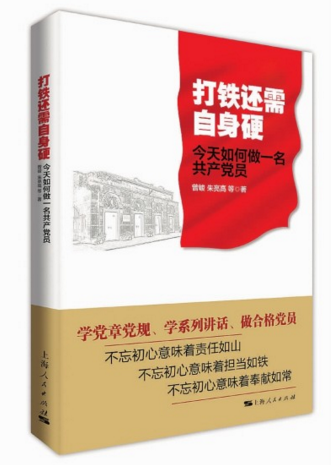By Austin Dean
Last summer, a bookstore in the Shanghai Pudong Airport listed an unlikely bestseller: To be Turned into Iron, the Metal Itself Must Be Strong: How to Be A Member of the Communist Party. It is hard to believe the book was flying off the shelves. Perhaps the rankings were manipulated; maybe all 88-million members of the Chinese Communist Party (CCP) had to buy a copy. Still, no matter how it got to the top, the book, though part of an old genre, has much to tell us about something quite new: the ongoing anti-corruption crackdown under CCP head and PRC President Xi Jinping.
Self-cultivation books, which have roots stretching back to Confucius’s Analects, have long been embraced by the CCP. In 1939, after the organization settled into the northwest of the country after the Long March, a very high-ranking cadre and later for a time heir apparent to Mao Zedong, Liu Shaoqi, wrote a famous series of lectures titled “How to Be a Good Communist,” which was published in various formats.
Packed with an eclectic array of quotations from Marx and Mencius, Mao Zedong and Confucius, Liu argued that every Communist “who wants to become a good politically mature revolutionary must undergo a long period of tempering in revolutionary struggle, must steel himself or herself (the lectures were aimed at both genders) in mass revolutionary struggles and all kinds of difficulties and hardships, must sum up the experience gained through practice, make great efforts in self-cultivation, raise his or her ideological level, heighten his or her ability and never loose sense of what is new.” Being a communist wasn’t supposed to be easy.
The authors of To Forge Iron You Need to Be Hard are two officials from Shanghai, Zeng Jun and Zhu Gaoliang. They write that some members of the party, confronted with a myriad of temptations — cash, car, real estate and sex — have forgotten their original intentions (chuxin) when joining the party: they swore to serve the people above all else.
The two make clear that a good communist might be a father, son, daughter, wife, brother or sister but the title of party member comes before all else. To illustrate this point they make a very thinly veiled reference to the property developer, social media star and Communist Party member Ren Zhiqiang. Ren, no stranger to speaking out against the party, was censured earlier this year and his social media accounts closed down. The authors don’t make the point explicit but what they wish to say remains clear. Ren had become too absorbed in his other identities and forgotten which one comes first. CCP members must remember that “their last name is Party” (xing Dang). They can’t choose to hide their identity when it might be useful and display it when it’s to their advantage. Being a party member is not a tool or a 9-5 job.
Zeng and Zhu’s good communists not only have to know the party rules and regulations and meet a minimum threshold of behavior: no abusing power, no corruption, no adhering to unwritten rules. They also have to hold themselves to a higher standard, constantly tempering themselves for larger goals.
One key goal is to carry out the “Chinese Dream.” A ubiquitous slogan in Xi Jinping’s China, it remains unclear exactly what the Chinese Dream means and who it belongs to. As historian (and co-editor of this blog) Jeffery Wasserstrom wrote in TIME Magazine, “Xi’s Chinese Dream is protean” and associated with “different things at different times and in different places.”
Quite often, the dream seems to return to ideas of national rejuvenation. The authors offer a number of examples. They begin with an arresting statement: a century ago Chinese people did not dare to have dreams. They insist that the base prerequisite of an individual’s dream is that China is strong, independent and prosperous. One hundred years ago, China was none of those things and thus individuals could not have their own dreams. According to this framework, the Chinese Dream and any individual’s dream are, in a favorite CCP turn of phrase, as close as lips and teeth.
The authors use an extended botanical metaphor to buttress the point. What Chinese citizen, they ask, would not like to stand under the protection of a large tree with numerous and lush leaves that guards them from wind and rain? What Chinese citizen would not like to see the country strong and powerful? An individual’s dream takes root on the base of the Chinese Dream — that the country become rich and powerful. The logic becomes circular. The Chinese Dream is the dream of every Chinese citizen because its realization will allow his or her own personal dreams to flourish. With this virtuous cycle in place, China will become a “Dream Factory”. It’s a clever, it not entirely convincing, piece of theory.
Zeng and Zhu refer lavishly from Marx, Mao, Confucius and Xi Jinping, yet the authors remain strangely silent on Liu’s “How to Be a Good Communist.” Perhaps it has something to do with the fact that Liu was persecuted during the Cultural Revolution, dying in jail. Despite being posthumously rehabilitated (books about Liu appear regularly in China), the fate of this fallen erstwhile second-in-command to Mao is a reminder of the tragedies of that era, when people were attacked, arrested and killed for explicitly political reasons — a charge that has been leveled at the current campaign against corruption. As the book and various other propaganda efforts have taken great pains to point out, the campaign’s targets are targets because they are guilty of corruption and not simply because they are Xi’s political enemies. The alleged proof of this? Just look at how much gold they had.


